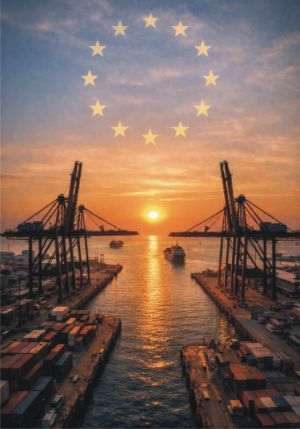• The ECB: Financing to the Greek bank, temporarily put on hold
Romanian banks in which the Greek shareholders have a controlling interest are solid institutions, Radu Graţian Gheţea, chairman of the Romanian Banking Association said yesterday: "I could see that first hand, by working with the Romanian banks with Greek shareholders".
Cristian Ionescu, the head of Coface România, considers that the high interest rates paid to depositors by the branches of the Greek banks present in our banking system, show that these institutions are trying to attract the Romanians' savings, since they are no longer receiving funding from Greece, but high interest also means a high risk. Doru Lionăchescu, the president of "Capital Partners", considers that the high interest rates on deposits mean could mean that the banks are faced with major money outflows.
On the withdrawals from Greek banks, Doru Lionăchescu said that this simply shows that customers are worried, rather than panicking. He said that panic is when there are limits placed on the amounts of money that can be withdrawn, means trucks loaded with money coming in to supply the banks, lines and rioting, which is not the case of Greece. "Banks need to have cash reserves and a proactive attitude", according to Doru Lionăchescu.
Cristian Ionescu also said that the panic among the customers, who have withdrawn their money from Greek banks, is irrational. In his opinion, if Greece were to actually collapse, we would also be directly affected through the domestic banking channels.
• The ECB is not willing to increase its exposure to Greek banks, before it sees a commitment to implement the policies which are needed
The European Central Bank (ECB) yesterday officially confimed that it has temporarily halted the financing to some Greek banks, to limit the assumed risks, according to Mario Draghi, the president of the ECB, who said he would not compromise the principles of the institution in order to keep Greece in the Eurozone. Providing funding to some of the lending institutions will be the responsibility of the Central Bank of Greece, until they consolidate their capital.
The halting of the funding by the ECB of the Greek banks comes on the back of the difficult political situation in Greece, considers Cristian Ionescu, the head of Coface Romania. He explained that the ECB is not willing to increase its exposure to the Greek banks, before its sees a commitment to implement the required policies. Most likely, things will become clear after the elections, if the votes will allow the creation of a government coalition, according to Cristian Ionescu.
The head of Coface Romania said: "It is a difficult situation. No one will give money to Greece if the politicians don't create a coalition. Still, Germany and France can't kick Greece out of the Eurozone because they would be affected themselves".
Thomas Costerg, economist at Standard Chartered Bank, London, claims that if so far the exit of Greece from the Eurozone was considered absurd, it is gradually becoming the base scenario. The ECB is placing its own financial situation above the geography of the monetary union, according to him.
Arnaud Poutier, deputy general manager at IG Markets France, said for Reuters, that the entire Greek banking system is in danger, because the banks are facing the biggest problem, namely the withdrawals of money from the deposits. This situation began at least two years ago and has only gotten more pervasive as the crisis escalated.
• Spain denies the withdrawals from Bankia
The Greeks weren't the only ones to withdraw their money from banks. Spaniards also followed their example, as the customers of Bankia (the fourth largest Spanish bank) pulled from their accounts one billion Euros over the last week, according to information from the Spanish publication "El Mundo." Following the announcement, the shares of Bankia yesterday fell more than 10% on the Madrid Stock Exchange, to 1.49 Euros.
Fernando Jimenez Latorre, secretary in the Ministry of the Economy of Spain, denied the information published in the Spanish press. He said yesterday, that there has been no massive withdrawal from Bankia.
"It is not true that at the current time there has been a withdrawal from the deposits of Bankia", the Spanish official said.
Bankia has been nationalized by the Spanish state, last week, in order to eliminate te fears that the lender might collapse because of the losses generated by the crash of the real estate market which appeared in 2008. According to the agreement, the 4.5 billion Euros (5.9 billion dollars) received by Bankia from the Spanish state in 2010 and 2011 will be converted into shares of the bank.
• Last year, bank deposits toured all of Europe
Last year, the savings of customers stored in bank deposits "migrated" all over Europe, according to a study based on data from over 120 European banks listed on the stock exchanges, according to Reuters.
Over 120 billion Euros were withdrawn from two Belgian banks, including Dexia, which had to be bailed out and restructured. Also, KBC saw massive outflows of deposits.
Approximately 90 billion Euros were withdrawn from French banks, including almost 30 billion dollars from Credit Agricole and BNP Paribas. Last year, French banks also suffered due to their heavy exposure to Greece and of liquidity concerns, which forced them to speed up their plans to downsize their networks.
Another 30 billion Euros were withdrawn from the Italian banks.
On the other hand, UK banks were flooded with cash inflows. Over 140 billion Euros were deposited in four major lenders. The United Kingdom benefits from the fact that it is not in the Eurozone, and HSBC and Standard Chartered, focused on Asia, are considered as safe haven institutions.
Banks which could be faced with cash inflows include Barclays, Deutsche Bank of Germany, Credit Suisse and UBS of Switzerland, Sberbank and VTB of Russia.
• Fitch: The 29 largest bans might need 556 billion dollars
The 29 largest banks in the world might need 556 billion dollars, to meet the new harsher capital requirements, which would lower their profit by 20%, would force them to cut investor benefits and to raise customer fees, according to a report of financial ratings firm "Fitch Ratings".
According to "Fitch Ratings" the 29 banks own assets of 47,000 billion dollars and might need an increase of the ordinary equity of 556 billion dollars to reach a Tier 1 capital adequacy ratio of approximately 10%, in order to meet the new Basel III regulations.
The banks will most likely pass various strategies to solve the issue of the capital increases, including keeping future gains, issuing shares and cutting risky assets, according to the financial ratings firm.
The return on equity (ROE), which is a gauge of profitability, could drop from the average of 11%, seen over the last few years, to approximately 8-9% according to the new regulations, "Fitch Ratings" warned.
Last year, the European banking Authority asked European Banks to bolster their capital to be better equipped to deal with the losses which might arise from the government bonds. By the end of June 2012, the main European banks might have to reach a Tier 1 Core Capital ratio of 9%.
By requiring banks to keep more capital tied up in reserves, the new regulations will cap lending, but will make them more resistant to risk.
•
• Radu Gheţea, chairman of the Romanian Banking Association for three more years
Radu Graţian Gheţea, the president of CEC Bank, was appointed yesterday for three more years as the chairman of the Board of Directors of the Romanian Banking Association (ARB). Radu Graţian Gheţea is on his fifth term as chairman of the RBA, a position he has been holding since 2000.
The RBA has become one of the most powerful professional associations in Romania, through the constant involvement of its members according to the provisions of the bylaws of the association and to the legal provisions in effect, and a dialogue partner in the relationship wth the Romanian authorities, the International Monetary Fund, the European Commission, the World Bank and other international and domestic institutions.
Also elected yesterday were the other members of the Board of Directors: vice-president - Petre Bunescu, and the following members: Sergiu Oprescu, Gheorghe Muntean, Laurenţiu Mitrache, Cătălin Vasile Pârvu, Sergiu Manea. The Board of Directors is the deliberation and decision making body of the RBA. The executive leadership is provided by the Executive Chairman, Florin Dănescu. The Romanian Banking Association, created in May 1991, brings together the whole banking industry active in Romania. The RBA currently has 40 members, lenders with state or private majority shareholders, branches and representative offices of foreign banks.


























































